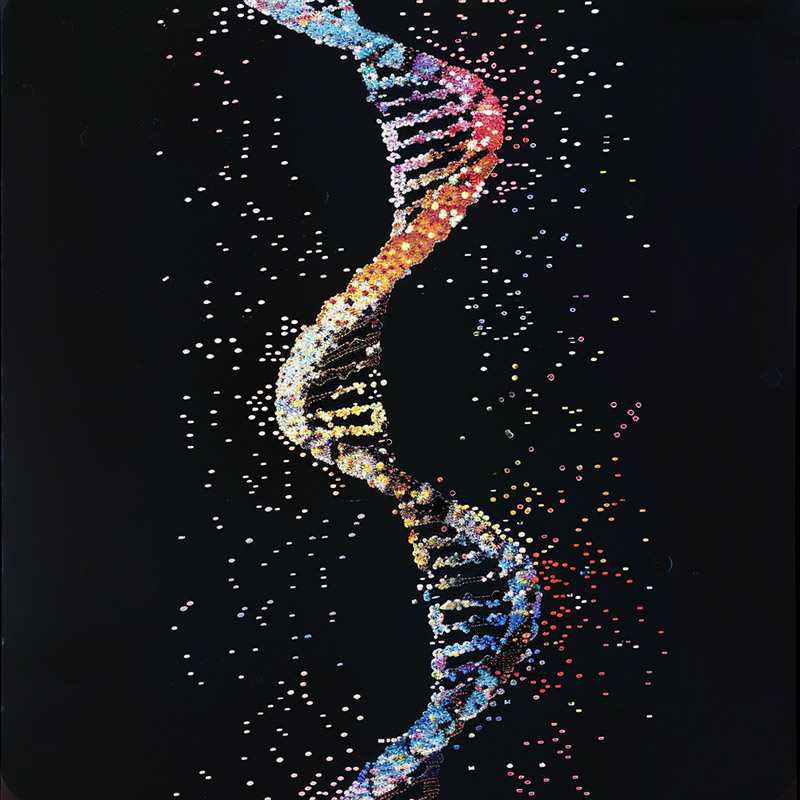The Human Genome Array is a microarray chip that contains probes for the entire human genome. It is used to analyze genetic variations across the whole genome by detecting the binding of fluorescently labeled DNA samples to the probes on the array.



Key features of the Human Genome Array include
- Comprehensive coverage - The array contains probes that span all ~30,000 genes in the human genome, providing a whole-genome perspective.
- SNP detection - The probes are designed to detect common single nucleotide polymorphisms (SNPs) throughout the genome. SNPs are variations in a single DNA building block that can have implications for disease risk, response to drugs, etc.
- Comparative genomic hybridization - By comparing DNA samples from normal and diseased tissues, the array can detect gains or losses of chromosomal segments, providing insights into genetic abnormalities.
- Gene expression analysis - The levels of gene expression across the entire genome can be assessed by analyzing RNA samples. This allows profiling of active genes in different cell/tissue types.
- Copy number variation - The array enables detection of duplicated or deleted regions of the genome, an important type of genetic variation.
The Human Genome Array allows high-throughput analysis of human genetic variation and gene expression on a genome-wide scale, providing insights into health, disease, and personalized medicine. The data generated serves as a valuable resource for biomedical research.
More than 1 Million Probes Analyze Expression Levels of Nearly 50,000 RNA Transcripts and Variants

In 2003, Affymetrix took orders for its new GeneChip brand Human Genome U133 Plus 2.0 Array, offering researchers the protein-coding content of the human genome on a single commercially available catalog microarray. The HG-U133 Plus 2.0 Array analyzes the expression level of nearly 50,000 RNA transcripts and variants with 22 different probes per transcript, providing superior data quality unmatched by technologies using a single probe per transcript.
"With about 1.3 million probes on a chip the size of a human thumbnail, the Human Plus Array represents a leap in array technology data capacity, and further demonstrates the unique power and potential of our technology to explore vast areas of the genome," said Trevor J. Nicholls, Ph.D., Chief Commercial Officer. "Multiple independent measurements for each transcript ensure that our data quality remains the industry standard, even as our data capacity increases dramatically."
The HG-U133 Plus 2.0 Array, which will ship in October, combines the content of the previous HG-U133 two-array set with nearly 10,000 new probe sets representing about 6,500 new genes, for a total of nearly 50,000 RNA transcripts and variants. This new information, verified against the latest version of the publicly available genome map, provides researchers the most comprehensive and up-to-date genome-wide gene expression analysis. The probe design strategy of the HG-U133 Plus 2.0 Array is identical to the previous HG- U133 Set, providing very strong data concordance between the two products. With more than double the data capacity of the previous-generation Affymetrix human product, the HG-U133 Plus 2.0 Array can significantly cut processing and analysis time for scientists in the lab, freeing up valuable resources and accelerating research.
The HG-U133 Plus 2.0 Array sets a new standard for the number of genes and transcripts on any commercially available single array for human gene expression analysis, while maintaining Affymetrix' unrivaled data quality. The HG-U133 Plus 2.0 Array uses 22 independent measures to detect the hybridization of each transcript on the array, 1.3 million data points in all, more than 30 times that of any other microarray technology. Using multiple, independent measurements provides optimal sensitivity and specificity, and the most accurate, consistent and statistically significant results possible.
"More data points produce more reliable results and ultimately, enable better science," said Nicholls. "Our powerful probe set strategy gives our customers the assurance that their array results actually reflect what's in their sample."
Affymetrix is also launching an updated 11-micron version of its popular 18-micron HG-U133A Array called the GeneChip HG-U133A 2.0 Array. The reduced feature size on this new design means researchers can use smaller sample volumes than on the previous 18-micron array without compromising performance. This new array represents over 20,000 transcripts that can be used to explore human biology and disease processes. All probe sets represented on the original GeneChip HG-U133A Array are identically replicated on the GeneChip HG-U133A 2.0 Array.
Affymetrix is a pioneer in creating breakthrough tools that are driving the genomic revolution. By applying the principles of semiconductor technology to the life sciences, Affymetrix develops and commercializes systems that enable scientists to improve the quality of life.